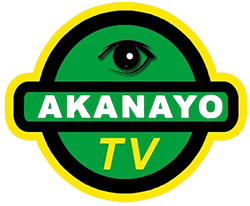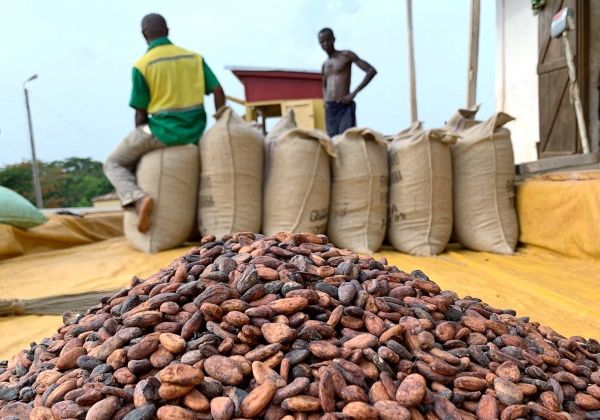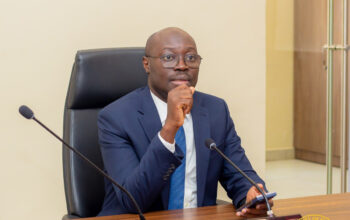A former Chief Executive Officer of the Ghana Cocoa Board (COCOBOD), Joseph Boahen Aidoo, has defended his tenure for the first time since leaving office, offering a spirited justification for the policies and decisions that defined his administration.
In an exclusive interview, Aidoo addressed the GH₵32.5 billion debt incurred by successive governments, describing it not as a mark of mismanagement but as a consequence of strategic interventions aimed at safeguarding Ghana as a force to reckon with in the cocoa industry.
He admits that though his administration also incurred a debt, the move, together with those incurred by the previous NDC administration, was meant to save the country’s cocoa sector from collapsing
“We inherited a lot of challenges. In fact, when I took over COCOBOD in 2017, my management team had no money for the 20217-2018 cocoa season. The previous administration had fully utilised the US$1.8bn syndicated loans and only achieved an average FOB price of US$2900. The last drawdown of about US$300 million from the US$1.8 billion syndicated loan amount occurred in the middle of December 2016 when the NDC had lost the elections. So, by December 31, 2016, the full amount of US$1.8 billion had been utilised and the new administration had to look for money for the cocoa purchases and some operational expenses in the remaining nine months of the 2016-2017 crop year. So, if history is fair, it will remember us not for incurring debt, but for shielding Ghana’s cocoa industry from total collapse,” he said.
He added, “We chose to act. We chose to protect the farmers, the supply chain, and the country’s economic future—even when it meant walking into the storm.”
Depleted institution
Aidoo recalled taking over a financially depleted institution in 2017, inheriting a GH₵1.8 billion syndicated loan that had already been drawn down by the previous administration, despite actual cocoa deliveries falling short of projections.
“Only 611,763 metric tonnes had been secured by December 2016, well below the 900,000 tonnes anticipated”, he revealed.
“We inherited empty coffers,” he stated. “There were no funds to purchase cocoa or pay farmers, and we faced urgent financial obligations to suppliers amid a 30% drop in world cocoa prices. We had to act swiftly or risk losing total control of the industry.”
Cocoa Bills
Aidoo’s administration turned to cocoa bills—short-term, high-interest instruments that raised over GH₵2.2 billion. The funds were channelled into critical purchases of over 355,000 tonnes of cocoa, payments to Licensed Buying Companies (LBCs), logistics, and the settlement of outstanding debts for chemicals and fertilizers.
“It’s disingenuous to suggest our debt was reckless,” Aidoo asserted. “It was an investment in continuity. Without it, Ghana’s cocoa sector would have come to a standstill.”
Economic Scope
Aidoo urged stakeholders to consider COCOBOD’s size and revenue-generating capacity when discussing its debt profile.
As of February 2025, cocoa purchases had exceeded 560,000 tonnes, valued at approximately GH₵45 billion based on Free On Board (FOB) pricing.
“People talk about debt but ignore revenue. COCOBOD consistently earns over $2 billion in annual cocoa receipts. With structured financing, it has the capacity to meet its obligations”, he asserted.
Ending syndicated borrowing
One of the most consequential reforms during Aidoo’s tenure was COCOBOD’s decision to forgo syndicated loans in the 2024/25 season—a move that marked a dramatic shift in cocoa financing after 32 years of external borrowing.
Contrary to speculation that Ghana had been disqualified from syndicated funding, Aidoo revealed that financial institutions had, in fact, offered more favourable terms. Still, COCOBOD chose to chart an independent course.
“We said no. For the first time in decades, we walked away from the dependency model and took control of our financing. That’s not weakness—that’s sovereignty”, he asserted.
Under the new model, LBCs procure cocoa, which is sold by the Cocoa Marketing Company (CMC) to global firms through forward contracts. Payments are made in U.S. dollars via Ghana International Bank and converted into cedis through the Bank of Ghana before being remitted to COCOBOD.
The approach has saved Ghana an estimated $150 million in interest and related fees this year alone.
Growing threat
Despite gains in financial autonomy, Aidoo warned of a growing threat posed by cocoa smuggling, particularly following Côte d’Ivoire’s recent 22.24% increase in producer prices.
The disparity, he noted, has rendered cocoa farming across the border more lucrative, tempting Ghanaian farmers to sell their beans illegally.
“We estimate that over 120,000 tonnes of cocoa—worth around $600 million—could be smuggled out before any syndicated facility even arrives. The warning signs are already here.”
The situation, he said, is worsened by COCOBOD’s recent decision to eliminate incentives for whistleblowers and law enforcement officers—a policy that previously deterred illicit trade.
“That decision is not just ill-advised—it’s dangerous,” Aidoo said. “We’ve removed the tools that helped us protect this vital industry.”
Leadership beyond politics
Aidoo concluded with a direct appeal to national leadership, urging a bipartisan commitment to safeguarding Ghana’s cocoa sector.
“This is not about political parties. It’s about the livelihoods of over 800,000 cocoa farmers, about national pride, food security, and economic justice. When the Ivorian market shifts, we must respond decisively. Delay is a luxury we cannot afford”, he noted.
With emotion and conviction, Aidoo defended his administration’s actions as necessary, even if unpopular.
“We took difficult decisions not because they were easy, but because they were necessary. That is what leadership demands.”




